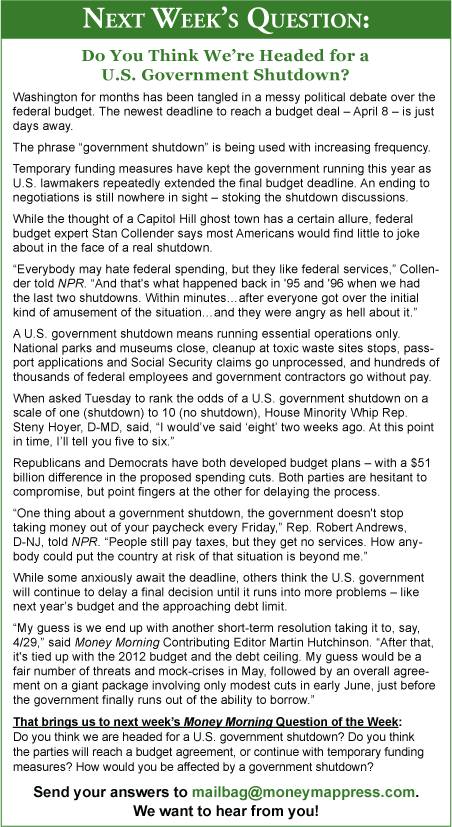There's no question the staggering rise in food and fuel prices will eat away at U.S. households' income in coming months.
But there is the question of how U.S. consumers will cope with those increased costs - especially when so many are already worried about their jobs, savings, investments and retirement.
With gas prices nearing $4.00 a gallon, and the consumer price index (CPI) in February for food-at-home up 2.8% from 2010, U.S. consumers are facing an economic double whammy. As food and fuel expenses make up a larger slice of household budgets, U.S. consumers have to evaluate just which goods are worth buying.
Montana resident Myriam Garcia some days has to choose between filling up her truck with gas or buying food.
"I can't really afford to drive to town," Garcia told The Associated Press. "If I can drive into town once a month, I'm lucky. Before, I had three boys so I was always creative with a limited amount of funds. Now I have to be even more creative because gas is so high."
The national average gasoline price was $3.582 on Tuesday, according to GasBuddy.com. Every $1 a barrel increase in crude oil prices means about a 2.5 cent increase at the gas pump, according to Chris Lafakis, an economist at Moody's Analytics. And every 1-cent per gallon increase in the average gasoline price will translate into $1 billion in extra expenses for consumers.
This means rising food and fuel prices are a fierce threat to consumer spending, which drives 70% of the U.S. economy.
"The American shopper was extremely cautious before. And now I'd say they are extremely worried," said Britt Beemer, president of America's Research Group (ARG). "What we are going to see happen is that consumers will try and cut back on all discretionary purchases, until finally they are going to have to make a decision at some point: what do I really have to give up?"

An ARG survey released last week showed 62% of those surveyed listed rising gas prices as their biggest economic concern right now, and about 75% of Americans were shopping less due to higher gas prices.
Economists at Morgan Stanley (NYSE: MS) and Deutsche Bank AG (NYSE: DB) cut spending forecasts based on data showing that U.S. households are using extra cash to boost savings. U.S. retailers fear this trend will continue through 2011.
"The most vulnerable chunks of Consumerville are casual family dining, followed by the frequency of shopping trips and search for lower-priced items, especially end-of-season markdowns," Richard Hastings, a macro and consumer strategist at Global Hunter Securities, told CNBC.
This prompted last week's Money Morning "Question of the Week": How are you dealing with high food and fuel prices? Have you changed your shopping or driving habits? Have you paid more attention to your household budget, or is your spending behavior unchanged?
Readers sent in the following answers about their money-saving techniques, as well as comments on the global food and fuel price rise.
Back to Work
Although I retired in 2005, I recently was extremely lucky to get a part-time job. The extra money has taken away the fear. Nevertheless, I buy nothing I don't desperately need and use all money not spent on food/gas/utilities/insurance/mortgage to pay down debts.
- Linda J.
Stick to the List
I go to my local grocery store Website, read the weekly circular, and click on the items on sale that I need. It makes a shopping list, which I take to the store. I make no other purchases-waiting for sales another time. Saved $49.57 on a bill of $122.00.
- Mary S.
Smaller Portions, Fewer Meals
I eat only two meals per day and I have actually cut the portions of everything I eat by at least 25%. I was in the grocery store yesterday and wondering how much it cost all of the food suppliers to repackage everything in downsized containers. Funny how it did not take long for that to happen, nor does anyone talk about the fossil fuel involved in such a process.
- Donna F.

Spoiled Brats
People in the United States should stop whining about gas prices and even food prices. In most European countries (and I'm sure it's the same in Japan, Singapore, Hong Kong, Australia, New Zealand), gas prices average $7 to $10 per gallon, and higher. I'd like to see gas in the U.S. be on par with EU prices, then things would be more in perspective. It will also get a lot of the much unneeded vehicles off the road, and demand will be there to get a half decent and much needed public transportation system up and running in some of the major towns and cities across the country.
So stop whining - the U.S. has never had it so good - spoiled brats, that all this country is!
- DD.
Use Food as Food
In order to bring down food prices, a good place to start would be putting a halt to mandatory ethanol (corn) in our gasoline. Let's stop burning our food supply!
- Mary W.
Riot Bound
Washington continues to pretend inflation does not exist as the Fed continues to play footsies with their Goldman Sachs buddies. Here is a prediction from someone who lived in the 60's and saw what a disenfranchised populace is capable of: When people are desperate they will ignore the leadership and "take what they need to survive". We are not far off the riots occurring around the world.
- Dave M.
Skipped Town
I moved to Medellin, Colombia where you can live as a king for less than $1000 a month.
- Robert S.
Smart Investing
My extra money is coming from investing in your fantastic recommendations!
- David P.
Be sure to answer next week's question: Do you think we are headed for a U.S. government shutdown? Do you think the parties will reach a budget agreement, or continue with temporary funding measures? How would you be affected by a government shutdown?
Send your answers to [email protected].!
Is there a topic you want to see covered as a "Question of the Week" feature? Then let us know by e-mailing Money Morning at [email protected]. Make sure to reference "question of the week suggestion" in the subject line. We reserve the right to edit responses for length, grammar and clarity.
Thanks to everyone who took the time to participate - via e-mail or by posting their comments directly on the Money Morning Web site.]
News and Related Story Links:
- Money Morning:
Hidden Inflation: Why Prices Are Rising Faster Than You Think - Reuters:
Rising gas prices eating into shopping budgets - The Associated Press:
Gas, food prices double whammy for rural families - Packaging Digest:
Food retailers cope with more inflation than shoppers - CNBC:
Consumers Can Manage Higher Gas Prices for Now - Businessweek:
U.S. Economy: Spending Cools as Food, Fuel Prices Climb - Money Morning News Archive:
Question of the Week Feature


